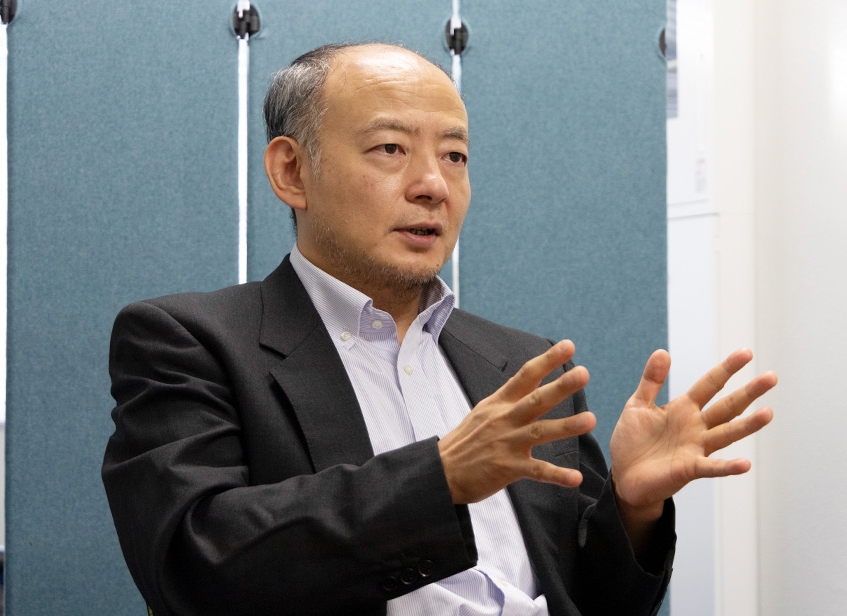Related Outline
I originally worked in the field of computational neuroscience using the Hodgkin-Huxley model. While this model is commonly described as a quantitative mathematical model of neuronal membrane potentials, in reality, it is a multiphysics system consisting of interactions between proteins and membrane potentials. Later, in the early 2000s, I began mathematical modeling studies on the morphogenesis of PC12 cells and hippocampal neurons. Repeatedly seeing live cell images convinced me that cell morphogenesis is a multiphysics system consisting of proteins, mechanical forces, and morphology itself. However, at that time, there was a strong trend in the field of biology, especially in mathematical modeling research, to explain function solely in terms of molecules and their interactions. Despite facing many obstacles and hardships in the course of my research, I was confident that I could quantitatively and mathematically model the polarization process of neuronal morphology using existing physical laws and experimental data. More recently, I was able to quantitatively formulate the migration rate of cell edges in terms of three Rho GTPase activation levels by taking into account the elastic energy of the cell membrane. Because of my background, I strongly sympathize with the objectives of this research area and am honored to be included in the open call for members. In this research area, I aim to utilize my past experience to elucidate the principles of angiogenesis formation. I will quantify experimental images and construct a quantitative mathematical model. I look forward to gathering and discussing with all of you.
Career
Apr, 2021 – Present Professor, Data Science Center, Nara Institute of Science and Technology
Apr, 2018 – Mar, 2021 Associate Professor, Graduate School of Science and Technology, Nara Institute of Science and Technology
Apr, 2017 – Mar, 2018 Associate Professor, Graduate School of Biological Sciences, Nara Institute of Science and Technology
Apr, 2012 – Mar, 2017 Associate Professor, School of Information Science and Technology, Aichi Prefectural University
Apr, 2011 – Mar, 2012 Associate Professor, Graduate School of Biological Sciences, Nara Institute of Science and Technology
Apr, 2004 – Mar, 2011 Associate Professor, Graduate School of Information Science, Nara Institute of Science and Technology
Apr, 2000 – Mar, 2004 Assistant Professor, Graduate School of Information Science, Nara Institute of Science and Technology
Apr, 1999 – Mar, 2000 Research Associate, Graduate School of Frontier Sciences, The University of Tokyo
Representative Achievements
- Discrimination of volatile organic compounds using a sensor array via a rapid method based on linear discriminant analysis
Itoh T, Koyama Y, Sakumura Y, Akamatsu T, Tsuruta A, Masuda Y, Shin W
Sensors and Actuators B: Chemical
DOI: https://doi.org/10.1016/j.snb.2023.133803, 2023. - Decoding cellular deformation from pseudo-simultaneously observed Rho GTPase activities
Kunida K, Takagi N, Aoki K, Ikeda K, Nakamura T, Sakumura Y
Cell Reports
DOI: https://doi.org/10.1016/j.celrep.2023.112071 - Sensing of substratum rigidity and directional migration by fast-crawling cells
Okimura C, Sakumura Y, Shimabukuro K, & Iwadate Y
Physical Review E
DOI: https://doi.org/10.1103/PhysRevE.97.052401, 2018. - Computational Methods for Estimating Molecular System from Membrane Potential Recordings in Nerve Growth Cone
Yamada T, Nishiyama M, Oba S, Jimbo HC, Ikeda K, Ishii S, Hong K & Sakumura Y
Scientific Reports
DOI: https://doi.org/10.1038/s41598-018-22506-3, 2018. - Fast-crawling cell types migrate to avoid the direction of periodic substratum stretching
Okimura C, Ueda K, Sakumura Y and Iwadate Y
Cell Adhesion & Migration
DOI: https://doi.org/10.1080/19336918.2015.1129482, 2016. - Actin Migration Driven by Directional Assembly and Disassembly of Membrane-Anchored Actin Filaments
Katsuno H, Toriyama M, Hosokawa Y, Mizuno K, Ikeda K, Sakumura Y, Inagaki N
Cell Reports
DOI: https://doi.org/10.1016/j.celrep.2015.06.048 - Bayesian Cell Force Estimation Considering Force Directions
Kozawa S, Sakumura Y, Toriyama M, Inagaki N, Ikeda K
Neural Processing Letters
DOI: https://doi.org/10.1007/s11063-013-9320-y, 2013 - Conversion of a Signal into Forces for Axon Outgrowth through Pak1-mediated Shootin1 Phosphorylation
Toriyama M, Kozawa S, Sakumura Y, Inagaki N
Curr Biol
DOI: https://doi.org/10.1016/j.cub.2013.02.017 - Systems Biology of Symmetry-Breaking during Neuronal Polarity Formation
Inagaki N, Toriyama M, Sakumura Y
Dev. Neurobiol
DOI: https://doi.org/10.1002/dneu.20837 - A Diffusion-based neurite length sensing mechanism involved in neuronal symmetry-breaking
Toriyama M, Sakumura Y, Shimada T, Ishii S, Inagaki N
Mol Syst Biol
DOI: https://doi.org/10.1038/msb.2010.51

